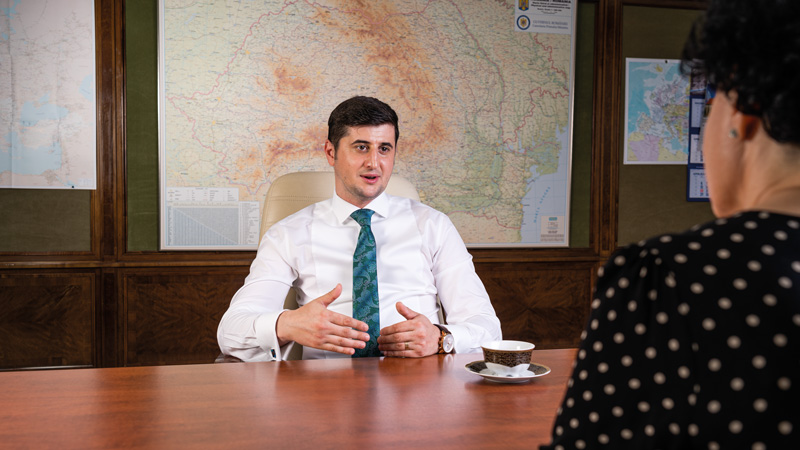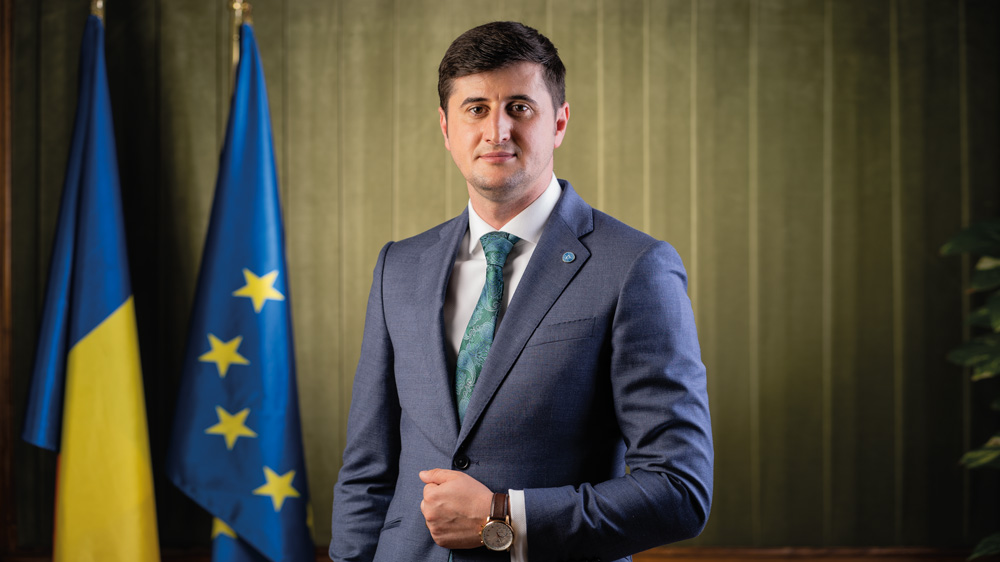State Secretary Lucian Petrica Rusu: Romanian Government Priorities for the Energy Sector
In an extended discussion, Lucian Petrica Rusu – State Secretary within the General Secretariat of the Government of Romania, emphasizes the main objectives of the Executive regarding the energy sector. They include reviewing how the natural resources of the country are managed and capitalized, as well as the development of energy production capacities from multiple sources.
For the Government, ensuring the energy security of the country, modernizing and streamlining the entire production cycle, from production and transmission to distribution to the end-consumer, are a priority. Also, adopting reliable solutions to increase the percentage of the population connected to the gas network.
Mr. Secretary of State, the studies and professional experience acquired in the energy sector provide you with an overview of the energy market in Romania. How do you currently assess the situation of the national energy sector, in the context of challenges at regional/global level – legislative, environmental, technological?
Lucian Petrica Rusu: The energy market in Romania is stable, interconnected at European level and represents an important player in the region. Moreover, we have the most balanced energy mix in the European Union and, in the future, with the Green Deal, I expect to see consistent measures of increase in the share of renewable energy in the national energy consumption.
CNTEE Transelectrica S.A. has proven to be an important player in the Eastern European region, including in terms of interconnection of energy systems, and its consumers benefit from security of electricity supply. On the other hand, SNTGN Transgaz permanently seeks to develop the transmission networks both domestically and internationally, and I would mention here especially BRUA gas transmission corridor. Let’s not forget that a number of objectives of the national gas transmission system (NTS) have been retrofitted and upgraded, endowed with modern automation equipment, including, inter alia: 948 regulating and metering stations, 106 block valves (line), 33 technological nodes, 5 compressor stations, 6 transit stations and 2 import stations and 7 underground storage facilities.
Both Transelectrica and Transgaz have prepared national development plans covering periods of 10 years, based on both the strategies and policies of the Government of Romania and on the objectives of the new policies of the European Union. For example, Transgaz estimates investments of almost EUR 5 billion in the development of the national gas transmission system (NTS) and in the expansion and upgrade of underground storage facilities.
Obviously, it’s not all rosy, and the COVID crisis has highlighted even further the need for digitization, automation and increase in investments in network modernization. The implementation of the SCADA system and the development of Smart Metering systems must be continued.
Moving from plans on paper to practice is yet to be perfected, but I trust the professionals of the National Energy System, whom I assure of my full support.
What tasks and duties do you specifically have within the Secretariat General of the Government of Romania?
Lucian Petrica Rusu: Specifically, I am in charge with the coordination of electricity and natural gas transmission companies. As you know, based on GEO 68/2019, the Secretariat General of the Government is responsible for the exercise of the rights and obligations arising from the capacity of shareholder of the Romanian state in the National Gas Transmission Company Transgaz S.A. Medias and in the National Power Grid Company Transelectrica S.A.
At the same time, I am also responsible for managing the Open Government Partnership (OGP), the Steering Committee of which also includes our country. Since 2012, the Government of Romania has been a member of OGP, together with other states that promote transparency, dialogue with citizens and the use of new technologies to consolidate the governing act. To remain in the sphere of the energy sector, the OGP member status could translate into the involvement of institutions and companies in the energy sector in the elaboration and implementation of Romania’s commitments at the sector level, thus generating greater transparency in the National Energy System and a more active participation of the civil society in developing strategies and programs. Such openness to society can generate trust, legitimacy and a valuable feedback from consumers and partners. I would also mention an OGP partner initiative – Extractive Industries Transparency Initiative (EITI) – which promotes transparency in the extractive sector, including through data management and publication standards, fiscal transparency and the publication of open data in the energy sector (authorizations, contracts, environmental measures etc.).
What global objectives are a priority for the Romanian Government in the next period?
Lucian Petrica Rusu: In the government program we highlight the special importance granted to the implementation of reforms necessary to modernize Romania in the European spirit and building citizen trust, and it also targets the energy sector. In terms of priorities of the Government led by PM Ludovic Orban, reviewing how natural resources are managed and capitalized on or the development of energy production capacities from multiple sources are not excluded.
For example, unlocking Black Sea investments is essential for the energy security. We repealed GEO 114 and the next step should be the amendment of the Offshore Law by the Parliament, where to have consensus in the interest of Romania. But these amendments should be agreed by the lawmaker as soon as possible, by consensus and transparent dialogue, maximizing the benefits for all those involved. Let’s not forget the European Green Deal, under which the European Union aims to reach climate neutrality of its economy by 2050 and which puts pressure on the use of fossil fuels.
Romania has assumed through the Green Deal a brave percentage of 30.7% renewable energy. It means investments, retrofitting, replacement and construction of new capacities, training human resources and, in an interconnected world, digitization.
Development of interconnection of energy systems at European Union level is also a priority. Here we can also talk about the project of closing the ring in Oradea, carried out by CNTEE Transelectrica S.A., the development of the power grid in Pancevo (Serbia) or implementing the BRUA project.
Regarding strictly Transgaz, the priorities included in the Development Plan include the interconnection of the energy system between Romania and the Republic of Moldova. Given the need to develop the Romanian gas transmission system, consideration was given to the improvement of gas supply to the north-east of Romania and the perspective offered by the interconnection pipeline between Romania and the Republic of Moldova (Iasi-Ungheni), which provides gas transmission capacities to/from Moldova. Works are being performed at the interconnection of the technological node Onesti with the technological node Letcani by building new compressor stations and new pipelines, which will have a transmission capacity of 1.5-2.2bcm/year, in the 2021 the gas pipeline following to be commissioned.
I assure you that at Government level we are working to define and protect vulnerable energy consumers, an important component for the improvement of policies in the field, especially in the context of electricity and gas price liberalization. We also monitor the implementation of provisions of legislation on corporate governance at CNTEE Transelectrica S.A. and SNTGN Transgaz S.A.

The energy sector represents a priority in the national economy, and carrying out privatization projects and attracting investments can contribute to ensuring the modernization and development of this sector, improvement of energy efficiency, safety in operation, energy security, meeting the energy demand both currently and in the medium and long term, in compliance with the principles of sustainable development. What measures can be taken in this regard and how do you see the evolution of the energy sector in Romania?
Lucian Petrica Rusu: The energy sector is a priority for the Government of Romania, being an important driver for economic development. It is a priority to ensure the energy security of the country, to modernize and streamline the entire cycle, from production and transmission to distribution to the end-consumer. At the same time, we build viable solutions to increase the percentage of the population connected to the gas network, as, although our country has important gas resources, less than half of the population is connected.
With the government program we assumed to support the strategic projects of Transgaz and Transelectrica. For example, Transelectrica has in progress almost 30 major investment projects. We have carefully analysed the annual investment plans of the two companies and requested a greater focus on reaching the proposed indicators. As you know, ANRE can charge a penalty of 5% of the turnover, if the plan for commissioning is not achieved.
We asked the energy transmission companies to accelerate digitization, modernization and retrofitting projects, given the energy efficiency component, so as to be financed including under the European Green Deal. For the following seven years approximately 25% of the European Union’s budget, totalling almost EUR 300bn, will be directed to projects that contribute to environmental protection and the reduction of carbon dioxide emissions. At the same time, under the Just Transition Fund of the European Union, non-reimbursable funds of EUR 4.4bn are allocated for Romania.
Therefore, there are many opportunities for the evolution of the energy sector, but it will be up to us to keep up.
What are the most important strategic regional/national programs/projects in which the Government of Romania is involved in 2020? Do you consider, at least in perspective, additional ways to attract funding sources, such as energy partnerships with foreign partners or involvement in regional cooperation programs?
Lucian Petrica Rusu: As previously mentioned, at CNTEE Transelectrica S.A., closing the 400 kV ring in the N-V of the country is a priority. The same is the ‘Mid Continental East Corridor’ Project, included by the European Commission in the first list of Projects of Common Interest (PCI), which will lead to increasing the electricity exchange capacity on borders between Romania – Hungary – Serbia.
From SNTGN Transgaz S.A. perspective, implementing BRUA project and interconnection with the Republic of Moldova through Iasi – Ungheni – Chisinau gas pipeline are some of the priorities.
Obviously, any partnership aimed to modernize and develop the National Energy System is welcome, as long as it is based on a sustainable approach, mutually advantageous and which brings benefits for Romanians. At the level of the Secretariat General of the Government, we are currently analysing several proposals of energy partnerships from other states. Therefore, we don’t exclude in any moment foreign partnerships or projects of regional cooperation in the list of funding sources, as long as they are in the interest of the energy system and of Romania.
As a member state of the European Union, Romania is a provider of energy security in the region and in Europe and has the potential to strengthen this role, actively contributing through its policy and programs to achieving the objectives of the European Union in the field of energy. What strategy will Romania apply in order to develop energy infrastructure and materialize the direct link between foreign policy and domestic policy in the energy sector, at the level of the European Union?
Lucian Petrica Rusu: Our country will participate in European projects for the interconnection of energy systems and to strengthen its position as a pole of energy stability in Eastern Europe. On the other hand, Romania is involved in the European process of integration of energy markets and has assumed clear commitments in the context of the European Green Deal.
At national level, SNTGN Transgaz will also have the possibility to develop its gas transmission network, through a program dedicated to the increase in the number of Romanian gas consumers.
An important role in the development of infrastructure and human resources in the energy sector can also be played by the research-innovation area. For this purpose, I call on Romanian universities and research institutes to start projects in partnership with energy producers and transmission operators, because the creative and innovative potential of our researchers can be a real support in bridging gaps and increasing competitiveness. I will give you an example from the Research Program of Transgaz, a project that developed an equipment for converting natural gas expansion energy into green electricity. Basically, they generated green energy from gas pressure, testing the generator under the conditions of parameters of gas supplied by S.C. Onesti station, proving the safe and efficient operation of the equipment. The project is still in testing.
Moreover, official data show that by 2030 natural gas will remain the preferred fuel for heating in the urban environment in Romania. The project of the Integrated National Energy and Climate Plan provides for an analysis on hydrogen injection in the form of synthesis gas from RES in natural gas transmission/distribution systems. In this context, I welcome the development of the Romanian Hydrogen and New Energy Technologies HUB, supported by the Ministry of European Funds and the Ministry of Education and Research, in the hope that it will generate viable solutions for obtaining hydrogen as a green fuel, through a cost-effective and attractive process for economic actors.
Another recent example of infrastructure development is the memorandum to transform the Galati plant into a green plant, the first steel plant in Europe with the lowest carbon footprint, with investments of EUR 1.2bn over the next 5 years.

What are the main directions of development in the gas sector, both in terms of transmission and gas storage component, with positive effects in strengthening regional cooperation between Romania and neighbouring states? How about security of energy supply and the transit of electricity in the regional market?
Lucian Petrica Rusu: Our country’s geostrategic position in relation to the important European transmission corridors is an advantage. We have a network of over 13,300 km of pipelines and a high level of domestic production. The priority project at this moment is the transmission corridor Bulgaria-Romania-Hungary-Austria – BRUA Phase 1, project aiming at the integration of the National Transmission System (NTS) into the European Network, by increasing the degree of interconnectivity with the adjacent systems. I would also mention here the Development of SCADA system for the National Gas Transmission System.
The Romanian gas hub plays an important role in market liberalization and in concentrating activities in the field for gas trading at the best prices, at a certain point. Obviously, it involves responsibility, constant supervision and support for vulnerable customers.
On the other hand, as mentioned in the government program, it is important to use Romanian gas in the production of electricity and in creating petrochemical products with high added value, with an increase in the storage capacity for the underground gas storage facilities.
Although the Romanian energy sector is currently stable and benefits from a balanced mix of resources, there are still deficiencies, improvements being necessary, especially due to an old problem – lack of major investments in this field. What do you consider to be the priority measures for improvement and which business segments have urgent needs?
Lucian Petrica Rusu: First of all, I believe there is a need for greater responsibility on the part of all those involved to carry out the investment and maintenance work on time. Blockages, be them bureaucratic in nature, must be avoided. Digitization is very important, as has been demonstrated even in this complicated period of pandemic, as is cyber security.
Yes, we need to adapt and modernize the technical component, but not only in terms of equipment, but also in terms of human resources. I believe that supporting dual education by developing specializations in partnership with major companies in the energy sector, conducting regular internship projects, as well as providing training courses for employees should be included in management plans. The human resource consisting of professionals is essential to overcome the gaps and to ensure continuity and balance in the system.
It is also worth carrying out a discussion on a collective labour agreement on this branch, to protect employees and to ensure more fairness of their wages.
Increasing the annual maintenance programs must be pursued, as well as the internalization of staff in subsidiaries performing services for parent companies. It is important to spend the budget component on the Annual Maintenance Plan of energy transmission companies.
The importance of the Southeast Europe area and Black Sea region is increasingly recognized from an energy point of view at the level of Member States of the European Union. The new political and economic conditions, the upward trend of demand for energy resources, the evolution of investments in the neighbouring areas – Caspian Sea, Middle East and Central Asia – in order to discover new reserves and develop hydrocarbon production and transmission and transit flows to Western Europe and the Black Sea riparian states, highlight the strategic role of regional cooperation and the European Union’s growing need to develop energy infrastructure. What role will Romania fulfil, in your opinion, in this equation?
Lucian Petrica Rusu: Romania is already playing an important role in the region, which I am convinced that we will consolidate and develop further in the future. Investment projects for the development of transmission and transit flows are a priority, so is the development of new reserves, the purpose being to increase the energy security of the population, as well as long-term sustainability. Our competitiveness in the energy sector and strategic positioning make us an important player at the level of the European Union and we have all prerequisites to play an increasingly important role. Moreover, I am convinced that Romania will become a regional hub, if we manage a greater interconnection, regulatory coherence and a consistent partnership with the private environment.
What is the basis of Romania’s vision for the energy field, in the context of the obligations assumed at European and international level? How can national policies respond to security and environmental requirements, as well as the needs of investors and energy market participants?
Lucian Petrica Rusu: National policies need greater clarity and stability in order to provide predictability in the energy sector and attractiveness in relation to private investors. For example, we should recall the negative impact of the famous Ordinance 114/2018 that generated price increases in chain, a decrease in contributions to the state budget, and Romanians were forced to pay record prices for electricity and natural gas. The modification of the harmful provisions of this Ordinance will also allow the resumption of strategic investments in the Black Sea.
With the Green Deal, the approach of the energy field is also made in relation to climate change. We want a fair contribution to the decarbonization of the European Union and the project of the National Integrated Energy and Climate Change Plan 2021-2030 is underway. I would also point out that we want to support research, development and innovation in the field, in order to overcome the gaps and increase local know-how.
An important aspect, besides the increase in foreign investments in our country, is also the increase of the internationalization of Romanian businesses in the field. I know that we have companies that have the capacity and the interest to invest in the regional markets. I remember that in 2017, the energy supplier and distributor Electrica S.A. submitted an offer to take over the company that CEZ owns in Bulgaria, and this year, Romgaz wanted to enter the project of the marine gas terminal in Greece.
What would be the main impediments/challenges faced by Romania in achieving the proposed goals?
Lucian Petrica Rusu: The need for consistency in regulation, simplification of procedures, especially from a bureaucratic perspective, clear targets for all major players in the energy system, professional, depoliticized management and a real partnership with the business environment. Obviously, the impact of the pandemic with the COVID-19 virus is a challenge, the implications of which cannot be fully quantified at this time.
As you well know, due to the decrease in consumption during this period, naturally, the price of energy also decreased. With the resumption of economic activities, we expect a return to energy consumption, in normal parameters. However, consistent support from the Government is essential.
Work is underway at a Recovery Plan focused on transition to green energy and digitization. We are aware that the oil and gas industry wants urgent measures to unlock the digitization process. However, this can only be achieved by updating the legislative framework to technological and safe progress. Unfortunately, due to legislative obstacles, Romania could not start the process of digitizing the oil industry, which generates high costs to close the gap.
As a result of the economic impact of the COVID-19 pandemic, a support scheme for small and medium-sized enterprises has also been developed, approved by the European Commission, based on which support will be provided in the form of direct subsidies and state guarantees for loans under form of investment and working capital, so that they can continue their activity. At the same time, our country intends to participate in the SURE instrument, for which a Guarantee Agreement will be signed.
With regard strictly to the energy sector, the Government announced in early May that large electricity consumers would receive support, and the aid scheme approved by the European Commission would become operational. Basically, the electricity price will be reduced by reducing the amount of CO2 by up to 20%. At the same time, the Romanian Government has recently proposed amending the Energy Law 123/2012, in order to stimulate new investments in electricity production and offering for producers to conclude bilateral contracts outside the centralized market, on the competitive market, wholesale or retail, at negotiated prices, in compliance with the competition rules, for electricity coming from new energy production capacities, commissioned after June 1, 2020.
How does the Government respond to the oil and gas industry’s request for urgent measures to unlock the digitization process in this sector?
Lucian Petrica Rusu: A roadmap of digitization must be established by companies. This roadmap will take into account the current stage and future steps for implementing digitization. I believe that in the stages identified in the roadmaps, where the implementation of legislative technique measures related to the digitization process is required, the Orban Government will support legislative initiatives to implement digitization within oil and gas companies.
Do you think that an Energy Union is possible without affecting the rights and competences of the Member States, mainly the right to establish their own energy mix and to remain technologically neutral?
Lucian Petrica Rusu: Romania supports the Energy Union project, which for our country can be translated including in the development of infrastructure and industry, better prices for consumers, economic growth and jobs. Obviously, we pursue a series of priorities such as capitalizing on our own energy resources, diversifying sources and supply routes or the right of each state to choose its energy mix. Protection of vulnerable consumers is essential. I am convinced that together we will be stronger and we can sustainably ensure the energy security and economic development of each Member State.







